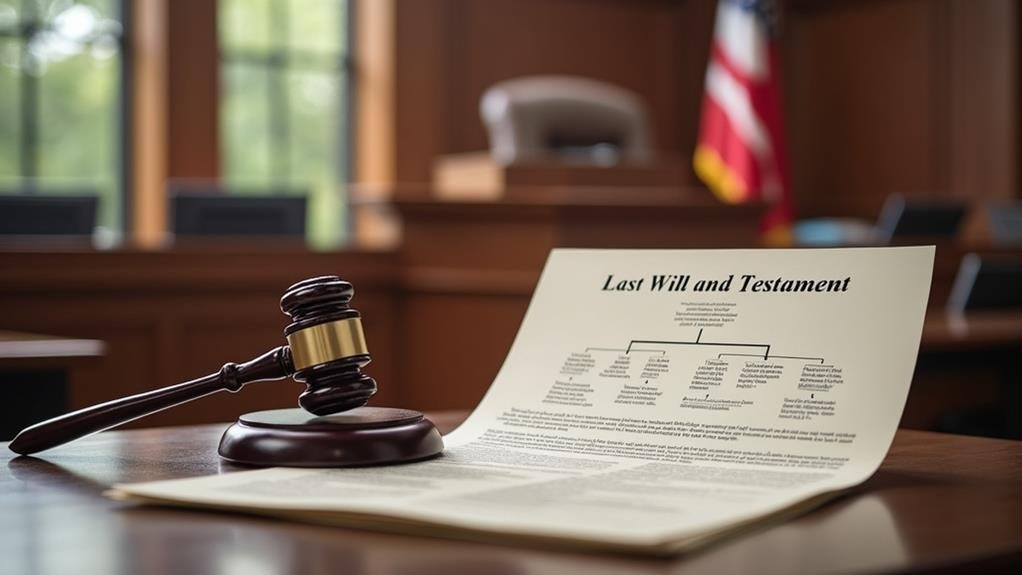Understanding probate in Virginia is vital for estate planning. Probate guarantees a deceased person’s assets are correctly distributed based on their will or state laws. Probate assets, like solely owned real estate, require judicial involvement, while non-probate assets, such as life insurance, transfer directly to heirs.
For small estates valued under $50,000, simplified procedures allow faster distribution. Executors handle these responsibilities, managing assets, and settling debts and taxes before distributing what’s left. Knowing these basics can help guarantee a smoother estate planning process. Keep learning to grasp the detailed steps involved.
Overview of the Probate Process
The probate process in Virginia begins with a court-supervised administration of a deceased person’s estate. This ensures that assets are allocated according to the decedent’s will or the state’s intestacy laws. Understanding this process is vital for individuals involved in estate planning, as it provides a clear framework for managing the assets and debts of someone who has died. Probate is typically required for assets that are solely owned by the deceased, while certain assets—like those in a trust or jointly owned—can bypass this procedure.
In Virginia, the probate court first authenticates the will if one exists or adheres to the intestacy laws if there is no will. The appointed executor, often a family member or trusted friend, collects the decedent’s assets, which may include bank accounts, real estate, and personal property. They are responsible for settling any outstanding debts and taxes using funds from the estate.
The timeline for the probate process can vary widely, lasting anywhere from six months to several years. This variability depends on factors like the estate’s size and the comprehensiveness of the decedent’s estate planning. Smaller estates may qualify for simplified procedures that expedite the process.
Grasping the probate process ensures effective asset distribution and provides reassurance to the decedent’s family and friends. Thoughtful estate planning can simplify the Virginia probate experience, minimizing the burden on those left behind.
Probate Vs. Nonprobate Assets
Understanding the distinctions between probate and nonprobate assets is vital for efficient estate planning in Virginia. Probate assets are those exclusively in the deceased’s name and require judicial oversight for distribution. Conversely, nonprobate assets bypass the judicial process and transfer directly to heirs, simplifying the procedure.
Non-probate assets encompass life insurance policies from companies like State Farm, retirement accounts such as 401(k)s and IRAs, and properties held in joint tenancy. These assets are structured to transfer seamlessly upon death, ensuring heirs receive them promptly. In contrast, probate assets—like a house exclusively owned by the deceased—must navigate through the judicial system, potentially leading to delays and increased expenses.
| Asset Type | Examples |
|---|---|
| Probate Assets | Solely owned real estate, personal bank accounts |
| Nonprobate Assets | Life insurance from Allstate, retirement accounts like IRAs |
| Judicial Involvement | Necessary for probate assets |
| Transfer Speed | Quicker for non-probate assets |
| Cost | Higher for probate due to judicial fees |
Recognizing which assets belong to each category aids in crafting an effective estate plan. By designating assets as nonprobate, individuals can facilitate a smoother, faster transfer to their loved ones, alleviating emotional and financial strain during a challenging period. Strategic estate planning promotes support for others by minimizing complications and fostering peace of mind.
Special Small Estate Procedures
In Virginia, estates valued at $50,000 or less often qualify for a simplified process known as Small Estate Administration. This approach allows for quicker distribution of assets without engaging in full probate procedures, alleviating stress for grieving family members. The Special Small Estate Procedures streamline the process, minimizing both the time and financial burden associated with probate, and providing a faster resolution and closure. Here are some important elements:
- Affidavit Submission: In cases where a will is absent, heirs can file an affidavit to manage real estate properties.
- Personal Property Affidavit: Heirs can complete an affidavit for personal possessions valued under $50,000.
- Simplified Procedure: This method offers shortcuts, greatly reducing the complexities of probate.
- Cost-Effective Solution: Small Estate Administration lowers legal fees and court expenses.
- Rapid Resolution: Families experience a quicker distribution of assets, aiding in prompt closure of affairs.
Executor Responsibilities
When taking on the role of an executor, individuals undertake the vital responsibility of managing the estate of the deceased, ensuring a seamless transfer of assets. Executors must first identify and collect all assets belonging to the deceased, which include probate assets like real estate and non-probate assets such as joint accounts and life insurance payouts. Recognizing the distinction between these asset types is crucial, as only probate assets require judicial oversight during the Virginia probate procedure.
Subsequently, the executor must adhere to the deceased’s wishes as specified in the will or, in the absence of a will, according to Virginia intestacy laws. Meticulous record-keeping is essential, as executors must file necessary tax documents, oversee estate finances, and secure court approval for asset distribution.
Opening a dedicated estate bank account is a common practice, offering a centralized hub for managing financial activities. Executors may also need to obtain professional valuations for specific assets to accurately assess their worth. Legal counsel can be invaluable in navigating complex estate regulations and ensuring proper management.
Ultimately, the executor must supervise the probate process and distribute assets effectively, honoring the deceased’s final wishes while complying with legal obligations. By executing these responsibilities, executors play a crucial role in serving the heirs and preserving the integrity of the estate.
Debts, Taxes, and Closing the Estate
In the Virginia probate process, settling liabilities and taxation takes precedence before distributing any inheritance to heirs. The personal representative is responsible for ensuring all valid liabilities and expenses are resolved, which includes adhering to the local probate court proceedings for any necessary actions. Creditors can submit formal claims to the Commissioner of Accounts, and in cases of disagreement, a hearing may be held. Executors must follow a specific order of priority for debt payments as outlined by Virginia law.
Estate taxation might be due depending on the estate’s valuation. Final Virginia and federal income tax returns must be filed, ensuring all tax responsibilities are met. Only after these obligations are addressed can assets be distributed to beneficiaries according to the will or, if there is no will, as per Virginia law. The court will then relieve the personal representative once all duties are completed.
Key steps include:
- Paying probate expenses, funeral expenses, and taxes foremost
- Settling all liabilities before distributing assets
- Filing final tax returns for the estate
- Distributing remaining assets to beneficiaries
- Providing thorough documentation and accounting to avoid legal disputes
FAQs
What Assets Must Go Through Probate in Virginia?
Assets solely owned by the deceased, such as real estate, bank accounts, and investments, must go through probate in Virginia. Jointly owned assets or those with designated beneficiaries generally bypass probate, easing the transfer process for heirs.
What Is the Key to Estate Planning?
The key to estate planning is creating a detailed plan for asset distribution. This includes wills and trusts, minimizing taxes, and ensuring wishes are honored. Consulting an experienced attorney helps navigate complexities and effectively serve loved ones.
How Much Does an Estate Have to Be Worth to Go to Probate in Virginia?
An estate in Virginia must be valued over $50,000 to require full probate. Smaller estates, valued at $50,000 or less, can use simplified procedures to help heirs and beneficiaries manage the estate quickly and efficiently.
Do You Need a Lawyer to Probate a Will in Virginia?
Although a lawyer is not required to probate a will in Virginia, it is highly recommended. An attorney can help navigate legal complexities, ensure efficient debt and asset distribution handling, and ultimately serve the deceased’s wishes and heirs effectively.




